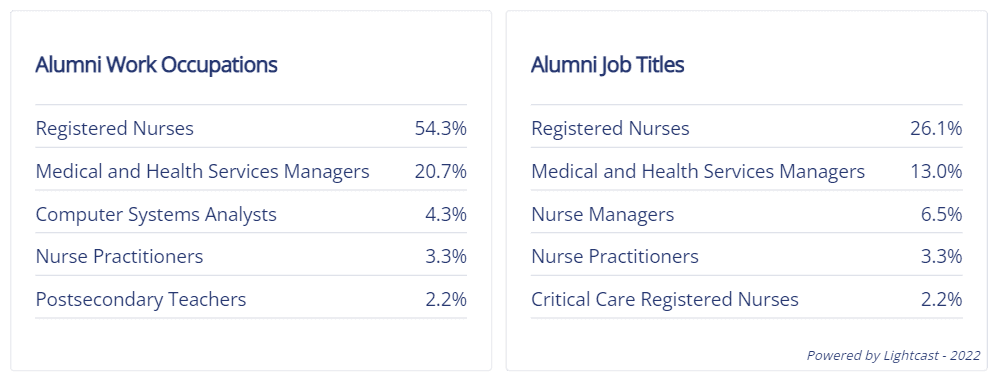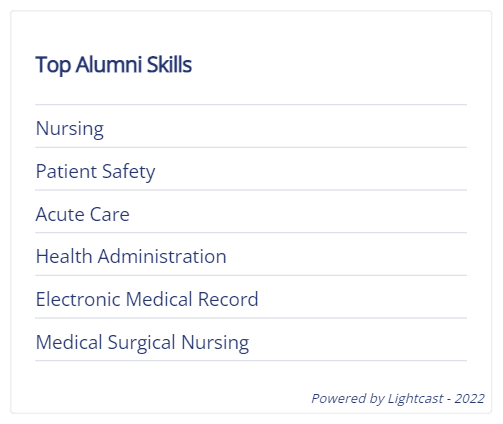Why should nurses with an Associate’s Degree in Nursing enroll in an RN to BSN Program? Although some employers do not require nurses to hold a Bachelor of Science in Nursing (BSN) degree, all registered nurses can benefit from returning to school and earning their BSN. RN to BSN programs can help advance a registered nurse’s career prospects, which opening the doors to new and exciting academic and vocational opportunities that help evaluate an RN career.
The Benefits of an RN To BSN Program
Career outcomes for those who complete an RN to BSN program can include higher salaries, opportunities for career advancement, and new educational advancement prospects.
Since students enrolled in RN to BSN programs have already completed two years of nursing school, passed the National Council Licensure Examination for Registered Nurses (NCLEX-RN), and likely have some experience working as registered nurses, many programs are built around elevating existing strengths of nurses while focusing on building real skills they will use throughout their course of practice. In many cases, RNs can apply the skills they’re learning in an RN to BSN program immediately.
Depending on the institution or the program, many RN to BSN programs do not require students to relearn basic nursing skills, take unnecessary prerequisites, or set rigorous and lengthy attendance schedules. Instead, programs are built with working professionals in mind, offering flexible courses with accelerated completion times that are sensitive to the demands of current RNs.
The benefits of enrolling in an RN to BSN program extend beyond academic advancement. Jobs for registered nurses are projected to increase significantly through the year 2026. But it’s not just careers in registered nursing. Nurse managers, acute care nurses, emergency room nurses, and more are all projected to increase through 2026 and beyond. Nurses who return to school for their bachelor’s degree can leverage these growth trends to secure new positions in parallel career fields or break into new specialties such as pediatric nursing care and oncology nursing care. RNs can also choose to return to school and earn their Master of Science in Nursing, opening doors to a career as a Nurse Practitioner.

RN To BSN at the University of Providence
The University of Providence’s Online RN to BSN Program offers currently practicing registered nurses the opportunity to earn their Bachelor of Science in Nursing in a 100% online, flexible learning environment.
Designed to meet the needs of working nurses, UPs RN to BSN program offers both an asynchronous and synchronous learning pathway for nursing professionals to choose from when enrolling in the program. These pathways provide students with the opportunity to pick a pathway that best suits their lifestyle while continuing to advance through the same lessons, courses, and outcomes.
Graduates of the RN to BSN program can expect to continue working as a registered nurse following graduation. Recipients of a BSN degree from will be prepared to take on various challenges within the fidl of nursing, including specialized nursing roles, leadership positions, or additional responsibilities within their current role. Based on data reported from Lightcast, a software used to college graduate outcomes for the University of Providence’s degree programs, graduates of the RN-BSN program continue to maintain their positions as registered nurses. However, some graduates leverage their new degrees to transition into becoming health service managers or return to school for a master’s to pursue a graduate degree, entering the field as nurse practitioners, nurse managers, or nurse educators.

Since the RN to BSN program builds upon previous skills in nursing, graduates of the program can put their new skills into practice as they progress through the program. Graduates become well-versed in a variety of nursing and healthcare-centered skills – including certain aspects of healthcare administration, health informatics, leadership, compliance, patient safety, and more. Students graduate as lifelong learners skilled in nursing and ready to take on wherever challenges are presented to them.

Apply To UPs RN to BSN Program Today
With a BSN from the University of Providence, currently practicing registered nurses with an Associate’s Degree in Nursing can earn their BSN in as little as one year. With synchronous and asynchronous learning paths available, RNs can choose the pathway that works best for them, helping them to take the next step in their nursing careers. Learn more about the Online Registered Nurse to Bachelor of Science in Nursing program today or visit the undergraduate admissions page for more information.
